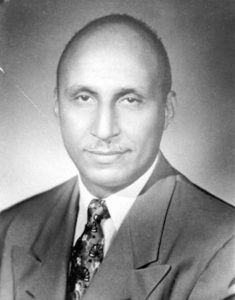
Oliver W. Hill
Oliver W Hill, Sr., a Black attorney and activist, was born on this date in 1907.
Hill was born Oliver White in Richmond, VA. His parents separated while he was still a baby, and he took his stepfather's last name. His family moved to Roanoke and then to Washington, D.C., where he graduated from Dunbar High School. He earned his undergraduate degree from Howard University and graduated from Howard University's School of Law in 1933. Hill was a classmate and close friend of future Supreme Court Associate Justice Thurgood Marshall. He graduated second only to Marshall in his class.
He began practicing law in Richmond in 1939. In 1940, working with fellow attorneys Thurgood Marshall, William H. Hastie, and Leon A. Ranson, Hill won his first civil rights case. The decision in Alston v. School Board of Norfolk, Va., gained pay equity for Black teachers. In 1943, Hill joined the United States Army and served in the European Theatre of World War II.
Hill was a civil rights lawyer who led the legal effort to desegregate public schools. In 1949, he won the right to equal transportation for schoolchildren in the Virginia Supreme Court. He also became the first African American on the City Council of Richmond since Reconstruction.
In the early 1950s, Hill was co-counsel in dozens of civil rights lawsuits in Virginia. In 1951, he took up the cause of the Black students at the segregated R. R. Moton High School in Farmville, who had walked out of their Black school because of deplorable conditions. The subsequent lawsuit, Davis v. County School Board of Prince Edward County, became one of the five cases decided under the landmark Brown v. Board of Education before the Supreme Court of the United States in 1954.
During this time, his and his family's safety was threatened by his work. The Hill family experienced a barrage of telephone threats, and at one point, a cross was burned on their lawn. Hill and his clients continued to wage legal battles, nevertheless. However, it would be more than ten years before many school districts in Virginia were significantly integrated, following the U.S. Supreme Court decision against freedom of choice plans in the Green v. School Board of New Kent County case of 1968. The Hill, Tucker, and Marsh law firm continued civil rights litigation until Hill retired in 1998.
Hill's accomplishments have earned many awards and citations, including the 1959 "Lawyer of the Year Award" from the National Bar Association, the "Simple Justice Award" from the NAACP Legal Defense and Educational Fund in 1986, and the American Bar Association's "Justice Thurgood Marshall Award" in 1993. President Clinton awarded Hill the "Presidential Medal of Freedom" in 1999. Students at the University of Virginia also honored him when they founded the Oliver W. Hill Black Pre-Law Association.
In 2000, he received the American Bar Association Medal and the National Bar Association "Hero of the Law" award. That same year, he and other NAACP Legal Defense Fund lawyers were honored with the "Harvard Medal of Freedom" for their role in the Brown v. Board of Education decision. In 2005, he was awarded the Spingarn Medal. He was also a member of Omega Psi Phi Fraternity, Inc. His bronze bust is visible in Richmond at the Black History Museum and Cultural Center of Virginia.
In 2005, Virginia Governor Mark R. Warner dedicated a newly renovated building in Virginia's Capitol Square in his honor. The Oliver W. Hill Building is the first state-owned building and the first in Virginia's Capitol Square to be named for an African American. His autobiography was published in 2000. Oliver Hill died peacefully during breakfast on August 5, 2007, at his home in Richmond at the age of 100.